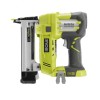Ryobi P360 User Manual - Page 4
Stapler Safety Warnings
 |
View all Ryobi P360 manuals
Add to My Manuals
Save this manual to your list of manuals |
Page 4 highlights
STAPLER SAFETY WARNINGS Additional safety protection will be required in some environments. For example, the working area may include exposure to noise level which can lead to hearing damage. The employer and user must ensure that any necessary hearing protection is provided and used by the operator and others in the work area. Some environments will require the use of head protection equipment. When required, the employer and user must ensure that head protection conforming to ANSI Z89.1-1997 is used. Keep fingers away from trigger when not driving fasteners to avoid accidental firing. Use safety equipment. Always wear eye protection. Dust mask, nonskid safety shoes, hard hat, or hearing protection must be used for appropriate conditions. Protect your lungs. Wear a face or dust mask if the operation is dusty. Following this rule will reduce the risk of serious personal injury. Protect your hearing. Wear hearing protection during extended periods of operation. Following this rule will reduce the risk of serious personal injury. Battery tools do not have to be plugged into an electrical outlet; therefore, they are always in operating condition. Be aware of possible hazards when not using your battery tool or when changing accessories. Following this rule will reduce the risk of electric shock, fire, or serious personal injury. Do not place battery tools or their batteries near fire or heat. This will reduce the risk of explosion and possibly injury. Use the tool only for its intended use. Do not discharge fasteners into open air. Use the tool only for the purpose for which it was designed. Use only the staples recommended for this tool. Use of the wrong staples could result in poor staple feeding, jammed staples, and staples leaving the tool at erratic angles. If staples are not feeding smoothly and properly, discontinue their use immediately. Jammed and improperly feeding staples could result in serious personal injury. Never use this tool in a manner that could cause a fastener to be directed toward anything other than the workpiece. Do not use the tool as a hammer. Always carry the tool by the handle. D o not alter or modify this tool from the original design or function without approval from the manufacturer. Always be aware that misuse and improper handling of this tool can cause injury to yourself and others. N ever clamp or tape the trigger or workpiece contact in an actuated position. Never leave tool unattended if the battery is installed. Do not operate this tool if it does not contain a legible warning label. Keep the tool and its handle dry, clean and free from oil and grease. Always use a clean cloth when cleaning. Never use brake fluids, gasoline, petroleum-based products, or any strong solvents to clean your tool. Following this rule will reduce the risk of loss of control and deterioration of the enclosure plastic. OPERATION Do not use tool if trigger does not actuate properly. Any tool that cannot be controlled with the trigger is dangerous and must be repaired. Check operation of the workpiece contact mechanism frequently. Do not use the tool if the workpiece contact mechanism is not working correctly as accidental driving of a fastener may result. Do not interfere with the proper operation of the workpiece contact mechanism. Do not use a tool that does not work correctly. Always assume that the tool contains fasteners. Do not carry the tool from place to place holding the trigger. Accidental discharge could result. Always handle the tool with care: • Respect the tool as a working implement. • Never engage in horseplay. • Never pull the trigger unless nose is directed toward the work. • Keep others a safe distance from the tool while tool is in operation as accidental actuation may occur, possibly causing injury. Choice of triggering method is important. Check manual for triggering options. The stapler is designed for single-hand use. Do not hold the tool by the front of the magazine. Do not put hands, head, or other parts of your body near the bottom of the magazine where the staple exits the tool, as serious personal injury could result. Do not point the tool toward yourself or anyone whether it contains fasteners or not. Do not actuate the tool unless you intend to drive a fastener into the workpiece. Always ensure that the workpiece contact is fully positioned above the workpiece. Positioning the workpiece contact only partially above the workpiece could cause the fastener to miss the workpiece completely and result in serious personal injury. 4 - English













